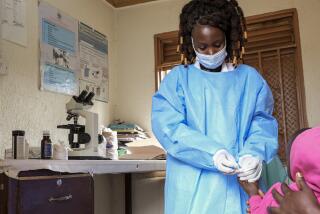Health official downplays hopes for experimental Ebola drugs
- Share via
Reporting from WASHINGTON — A top federal health official sought Thursday to downplay hopes that new drugs to combat the Ebola virus are imminent despite reports that experimental drugs may have helped two stricken U.S. aid workers as the deadly epidemic continued to ravage parts of West Africa.
“We don’t know if [the drugs] work and we can’t have them in significant numbers,” Dr. Tom Frieden, director of the U.S. Centers for Disease Control and Prevention, told a House subcommittee hearing. “I don’t want any false hopes out there.”
In Geneva, global health experts at the World Health Organization met for the second day to consider additional measures to control the outbreak, which has killed at least 932 people since March. The death toll is the worst since the virus was identified in 1976.
The CDC has raised its emergency response to Level 1, its highest, to support a surge of U.S. medical personnel being sent to Liberia, Sierra Leone and Guinea, the worst-hit countries, backed by more than 200 in Atlanta.
The CDC has deployed 31 doctors and other medical workers to the region, and will send 50 more in coming weeks, Frieden said. With more than 1,700 confirmed Ebola cases, some hospitals have collapsed and clinics have closed as local medical workers have become sick or fled, adding to the challenge.
The outbreak is West Africa’s first experience with Ebola, and it appears especially deadly because much of the region is impoverished, with poor healthcare and burial practices that encourage the virus to spread.
“It’s like fighting a forest fire: Leave behind one burning ember, one case undetected, and the epidemic could reignite,” Frieden said. “We have a difficult road ahead, which will take many months, but we must redouble our efforts to bring this terrible outbreak under control.”
There is no cure or vaccine for Ebola, which is spread by contact with infected bodily fluids.
After months of lax quarantine procedures, Liberia and Sierra Leone trucked in soldiers and set up roadblocks to limit travelers’ movements and to enforce a quarantine on affected areas.
Officials in Sierra Leone said passengers would undergo health inspections at the international airport, and no one would be allowed to travel if he or she had a temperature.
Liberia has been overwhelmed by the crisis, and President Ellen Johnson Sirleaf declared a 90-day state of emergency Wednesday, giving soldiers the power to close the borders and enforce strict quarantines. She said 32 doctors and health workers have died from Ebola.
A nurse and three more clinical staff died at the C.H. Rennie Hospital in Kakata, northwest of the capital, Monrovia. Eleven other staffers at the hospital had Ebola symptoms, according to local media reports.
A Liberian Senate election scheduled for October has been canceled because of the disease, with health experts warning it will take months to get the outbreak under control.
Nigerian Health Minister Onyebuchi Chukwu described the Ebola outbreak in Lagos, the nation’s largest city, as a national emergency. Seven Ebola cases have been confirmed in Nigeria, and two people have died.
“Everyone in the world today is at risk,” Chukwu told a parliamentary committee.
Dr. Kent Brantly, 33, and Nancy Writebol, 59 — the Americans who contracted the disease in Liberia — were reported to be improving at Emory University Hospital in Atlanta. Both were treated with ZMapp, an experimental drug that had been tested only on monkeys, before they were flown to the U.S.
Frieden said it wasn’t clear whether ZMapp had helped them. The drug is not “easy to use,” he said, and may cause unknown side effects. He said clinical trials and other studies must be conducted before the drug is proved to be safe and effective against Ebola.
“There will be hope, great hope, if ZMapp works and the two Americans who have bravely agreed to test it — and it has a positive effect,” said Rep. Christopher H. Smith (R-N.J.), chairman of the House Foreign Affairs subcommittee on Africa and global health, which held the hearing. “Still, it won’t mean that it’ll be produced in great quantities quickly and sent to affected people in West Africa.”
Bratek reported from Washington and Dixon from Johannesburg, South Africa.
More to Read
Sign up for Essential California
The most important California stories and recommendations in your inbox every morning.
You may occasionally receive promotional content from the Los Angeles Times.










